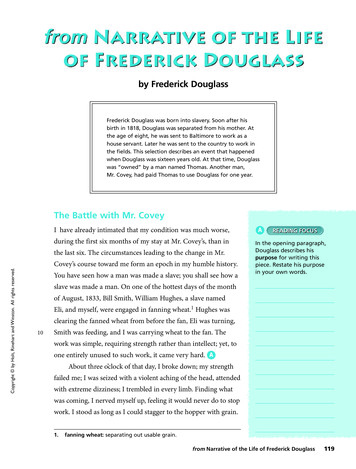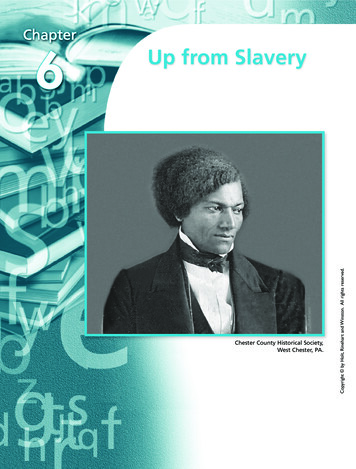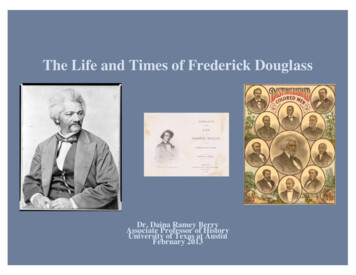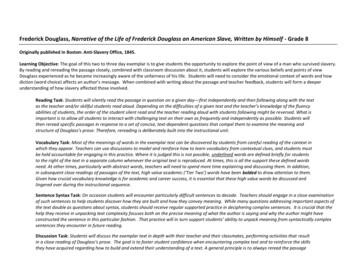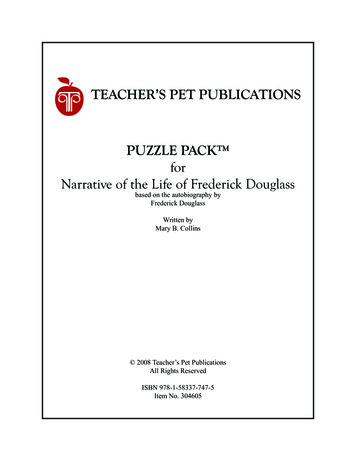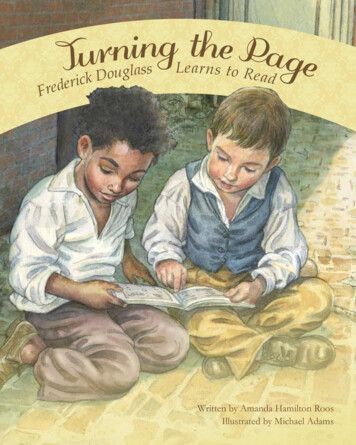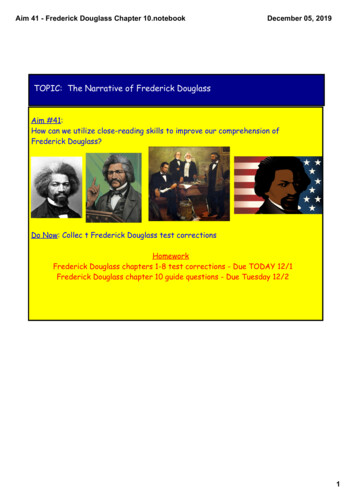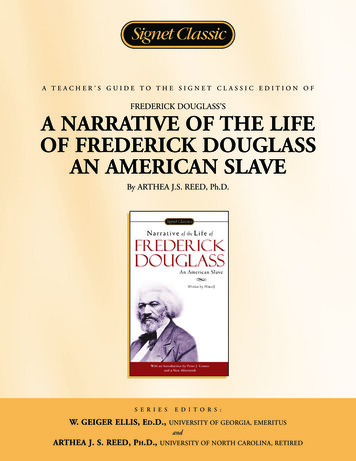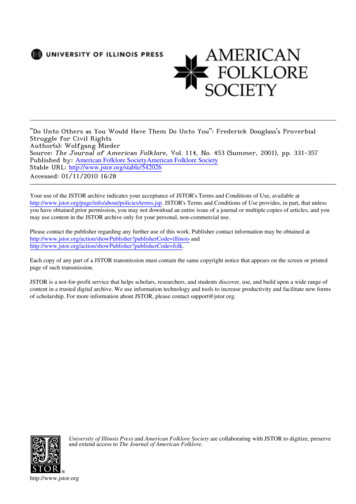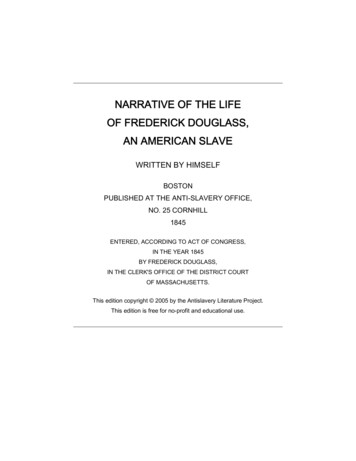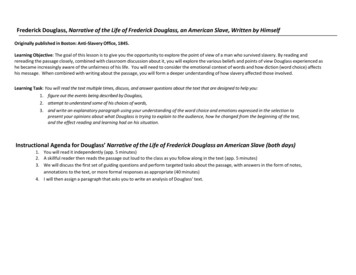
Transcription
Frederick Douglass, Narrative of the Life of Frederick Douglass, an American Slave, Written by HimselfOriginally published in Boston: Anti-Slavery Office, 1845.Learning Objective: The goal of this lesson is to give you the opportunity to explore the point of view of a man who survived slavery. By reading andrereading the passage closely, combined with classroom discussion about it, you will explore the various beliefs and points of view Douglass experienced ashe became increasingly aware of the unfairness of his life. You will need to consider the emotional context of words and how diction (word choice) affectshis message. When combined with writing about the passage, you will form a deeper understanding of how slavery affected those involved.Learning Task: You will read the text multiple times, discuss, and answer questions about the text that are designed to help you:1. figure out the events being described by Douglass,2. attempt to understand some of his choices of words,3. and write an explanatory paragraph using your understanding of the word choice and emotions expressed in the selection topresent your opinions about what Douglass is trying to explain to the audience, how he changed from the beginning of the text,and the effect reading and learning had on his situation.Instructional Agenda for Douglass’ Narrative of the Life of Frederick Douglass an American Slave (both days)1. You will read it independently (app. 5 minutes)2. A skillful reader then reads the passage out loud to the class as you follow along in the text (app. 5 minutes)3. We will discuss the first set of guiding questions and perform targeted tasks about the passage, with answers in the form of notes,annotations to the text, or more formal responses as appropriate (40 minutes)4. I will then assign a paragraph that asks you to write an analysis of Douglass’ text.
Day One: Douglass’ Narrative of the Life of Frederick Douglass an American SlaveText Under DiscussionThe plan which I adopted, and the one bywhich I was most successful, was that ofmaking friends of all the little white boyswhom I met in the street. As many ofthese as I could, I converted intoteachers. With their kindly aid, obtainedat different times and in different places,I finally succeeded in learning to read.When I was sent on errands, I always tookmy book with me, and by going on onepart of my errand quickly, I found time toget a lesson before my return. I used alsoto carry bread with me, enough of whichwas always in the house, and to which Iwas always welcome; for I was muchbetter off in this regard than many of thepoor white children in our neighborhood.This bread I used to bestow upon thehungry little urchins, who, in return,would give me that more valuable breadof knowledge. I am strongly tempted togive the names of two or three of thoselittle boys, as a testimonial of thegratitude and affection I bear them; butprudence forbids;—not that it wouldinjure me, but it might embarrass them;for it is almost an unpardonable offenceto teach slaves to read in this Christiancountry. It is enough to say of the dearlittle fellows, that they lived on PhilpotStreet, very near Durgin and Bailey’s shipyard.Directions for Teachers/Guiding Questions For Students(Q1) Why is Douglass specific about making friends with “little white boys”?(Q2) How did Douglass learn how to read when running errands?choregiveto showthankfulness;state of beingwise andcarefulplace whereships arerepaired orbuilt(Q3) In what ways does Douglass’ life differ from the white boys’ lives? What is surprising about theirdifferent situations?(Q4) Douglass is describing events from the past. These “boys” are now adult men, so why would heavoid giving their names?
Text Under DiscussionDirections for Teachers/Guiding Questions For StudentsI used to talk this matter of slavery overwith them. I would sometimes say to them,I wished I could be as free as they would bewhen they got to be men. “You will be freeas soon as you are twenty-one, but I am aslave for life! Have not I as good a right tobe free as you have?” These words used totrouble them; they would express for methe liveliest sympathy, and console mewith the hope that something would occurby which I might be free.I was now about twelve years old, and thethought of being a slave for life began tobear heavily upon my heart. Just about thistime, I got hold of a book entitled “TheColumbian Orator.” Every opportunity I got,I used to read this book. Among much ofother interesting matter, I found in it adialogue between a master and his slave.The slave was represented as having runaway from his master three times. Thedialogue represented the conversationwhich took place between them, when theslave was retaken the third time. In thisdialogue, the whole argument in behalf ofslavery was brought forward by the master,all of which was disposed of by the slave.The slave was made to say some very smartas well as impressive things in reply to hismaster—things which had the desiredthough unexpected effect; for theconversation resulted in the voluntaryemancipation of the slave on the part of themaster.(Q5) This is a question about a specific word choice made by Douglass. Why do you think he chose the word“troubled?” Why do you think it is a better choice than a word like “angered?”It may help to get the definitions of each word from the Oxford English Dictionary:troubleVERB1. Cause distress or anxiety to.‘he was not troubled by doubts’2. Cause (someone) inconvenience ‘sorry to trouble you’‘could I trouble you for a receipt?’angerVERBspeaker1. Fill (someone) with anger; provoke anger in.‘she was angered by his answer’‘he was angered that he had not been told’thrownout(Q6) Why does Douglass describe the master’s response as both “desired” and “unexpected”? Whythe contrast between these two words?release
Day Two: Douglass’ Narrative of the Life of Frederick Douglass an American SlaveDirections for Teachers/Guiding Questions For StudentsText Passage under DiscussionIn the same book, I met with one ofSheridan’s mighty speeches on and inbehalf of Catholic emancipation. Thesewere choice documents to me. I readthem over and over again with unabatedinterest. They gave tongue to interestingthoughts of my own soul, which hadfrequently flashed through my mind, anddied away for want of utterance. Themoral which I gained from the dialoguewas the power of truth over theconscience of even a slaveholder. What Igot from Sheridan was a bolddenunciation of slavery, and a powerfulvindication of human rights. The readingof these documents enabled me to uttermy thoughts, and to meet the argumentsbrought forward to sustain slavery; butwhile they relieved me of one difficulty,they brought on another even morepainful than the one of which I wasrelieved. The more I read, the more I wasled to abhor and detest my enslavers. Icould regard them in no other light than aband of successful robbers, who had lefttheir homes, and gone to Africa, andstolen us from our homes, and in astrange land reduced us to slavery. Iloathed them as being the meanest aswell as the most wicked of men.a movementto allowpeople fromthis religionto have fullrightsspeaking outloud(Q7) When Douglass says, “They gave tongue to interesting thoughts,” how is he using the word“tongue”?(Q8) What moral did Douglass learn from these books?publiclycondemn(Q9) How does Douglass use the word “enable?” In other words, how can documents “enable” himto “utter [his] thoughts” or write?keep alivehate(Q10) In what ways is Douglas saying slaveholders are like robbers? Find and explore the structureof the sentence that gives voice to this idea most clearly.
Directions for Teachers/Guiding Questions For StudentsText Passage under DiscussionAs I read and contemplated the subject,behold! that very discontentment whichMaster Hugh had predicted would followmy learning to read had already come, totorment and sting my soul to unutterableanguish. As I writhed under it, I would attimes feel that learning to read had beena curse rather than a blessing. It hadgiven me a view of my wretchedcondition, without the remedy. It openedmy eyes to the horrible pit, but to noladder upon which to get out. Inmoments of agony, I envied my fellowslaves for their stupidity. I have oftenwished myself a beast. I preferred thecondition of the meanest reptile to myown. Any thing, no matter what, to getrid of thinking! It was this ever- lastingthinking of my condition that tormentedme. There was no getting rid of it. It waspressed upon me by every object withinsight or hearing, animate or inanimate.The silver trump of freedom had rousedmy soul to eternal wakefulness. Freedomnow appeared, to disappear no moreforever. It was heard in every sound, andseen in every thing. It was ever present totorment me with a sense of my wretchedcondition. I saw nothing without seeing it,I heard nothing without hearing it, andfelt nothing without feeling it. It lookedfrom every star, it smiled in every calm,breathed in every wind, and moved inevery storm.(Q11) What prediction did Douglass’ owner make about what would happenif he learned to read? Did it come true? Why or why not?squirmed orstruggledmiserable(Q12) What is the horrible pit? Why does Douglass envy someone’s stupidity?alive(Q13) Why is freedom tormenting Douglass?resource oradvantagemoreimportantthan anyother (shortfor trumpet)HW - Paragraph Prompt: How do Douglass' feelings change over the course of this piece?What is Douglass trying to show about how slavery makes people feel? Write a paragraph inwhich you show how his feelings change and what you believe he is trying to show the reader.
The Text: Douglass, Frederick. Narrative of the Life of Frederick Douglass, an American Slave, Written by Himself (1845)Exemplar TextThe plan which I adopted, and the one by which I was most successful, was that ofmaking friends of all the little white boys whom I met in the street. As many of these as Icould, I converted into teachers. With their kindly aid, obtained at different times and indifferent places, I finally succeeded in learning to read. When I was sent on errands, Ialways took my book with me, and by going on one part of my errand quickly, I foundtime to get a lesson before my return. I used also to carry bread with me, enough ofwhich was always in the house, and to which I was always welcome; for I was muchbetter off in this regard than many of the poor white children in our neighborhood. Thisbread I used to bestow upon the hungry little urchins, who, in return, would give methat more valuable bread of knowledge. I am strongly tempted to give the names oftwo or three of those little boys, as a testimonial of the gratitude and affection I bearthem; but prudence forbids;—not that it would injure me, but it might embarrass them;for it is almost an unpardonable offence to teach slaves to read in this Christiancountry. It is enough to say of the dear little fellows, that they lived on Philpot Street,very near Durgin and Bailey’s ship-yard. I used to talk this matter of slavery over withthem. I would sometimes say to them, I wished I could be as free as they would bewhen they got to be men. “You will be free as soon as you are twenty-one, but I am aslave for life! Have not I as good a right to be free as you have?” These words used totrouble them; they would express for me the liveliest sympathy, and console me withthe hope that something would occur by which I might be free.I was now about twelve years old, and the thought of being a slave for life began tobear heavily upon my heart. Just about this time, I got hold of a book entitled “TheColumbian Orator.” Every opportunity I got, I used to read this book. Among much ofother interesting matter, I found in it a dialogue between a master and his slave. Theslave was represented as having run away from his master three times. The dialoguerepresented the conversation which took place between them, when the slave wasretaken the third time. In this dialogue, the whole argument in behalf of slavery wasbrought forward by the master, all of which was disposed of by the slave. The slave wasmade to say some very smart as well as impressive things in reply to his master—thingswhich had the desired though unexpected effect; for the conversation resulted in thevoluntary emancipation of the slave on the part of the master.Vocabularychore (singular)giveto show ofthankfulness;state of being wiseand carefulplace where shipsare repaired orbuiltspeakerthrown outrelease
In the same book, I met with one of Sheridan’s mighty speeches on and in behalf ofCatholic emancipation. These were choice documents to me. I read them over and overagain with unabated interest. They gave tongue to interesting thoughts of my own soul,which had frequently flashed through my mind, and died away for want of utterance.The moral which I gained from the dialogue was the power of truth over the conscienceof even a slaveholder. What I got from Sheridan was a bold denunciation of slavery, anda powerful vindication of human rights. The reading of these documents enabled me toutter my thoughts, and to meet the arguments brought forward to sustain slavery; butwhile they relieved me of one difficulty, they brought on another even more painfulthan the one of which I was relieved. The more I read, the more I was led to abhor anddetest my enslavers. I could regard them in no other light than a band of successfulrobbers, who had left their homes, and gone to Africa, and stolen us from our homes,and in a strange land reduced us to slavery. I loathed them as being the meanest as wellas the most wicked of men. As I read and contemplated the subject, behold! that verydiscontentment which Master Hugh had predicted would follow my learning to readhad already come, to torment and sting my soul to unutterable anguish. As I writhedunder it, I would at times feel that learning to read had been a curse rather than ablessing. It had given me a view of my wretched condition, without the remedy. Itopened my eyes to the horrible pit, but to no ladder upon which to get out. In momentsof agony, I envied my fellow-slaves for their stupidity. I have often wished myself abeast. I preferred the condition of the meanest reptile to my own. Any thing, no matterwhat, to get rid of thinking! It was this everlasting thinking of my condition thattormented me. There was no getting rid of it. It was pressed upon me by every objectwithin sight or hearing, animate or inanimate. The silver trump of freedom had rousedmy soul to eternal wakefulness. Freedom now appeared, to disappear no more forever.It was heard in every sound, and seen in every thing. It was ever present to torment mewith a sense of my wretched condition. I saw nothing without seeing it, I heard nothingwithout hearing it, and felt nothing without feeling it. It looked from every star, it smiledin every calm, breathed in every wind, and moved in every storm.a movement toallow Catholicsto have fullrights; speakingout loudpublicly condemnkeep alivehatesquirmed orstruggledmiserablealive; resource oradvantage moreimportant thanany other
Frederick Douglass, Narrative of the Life of Frederick Douglass, an American Slave, Written by Himself Originally published in Boston: Anti-Slavery Office, 1845. Learning Objective: The goal of this lesson is to give you the opportunity to explore the point of view of a man who survived slavery.By reading and rereading the passage closely, combined with classroom discussion about it, you will .
